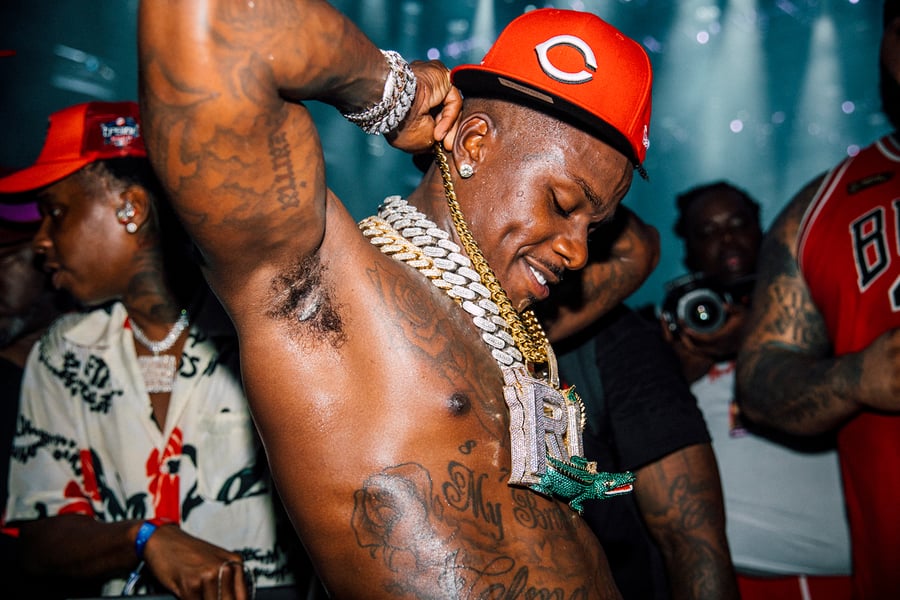DaBaby has always been a troll of sorts. In 2017, the rapper showed up at the Austin music festival South by Southwest in a diaper, performing a publicity stunt that poked fun at his chosen rap persona. Now, four years from his introduction to the masses, DaBaby has taken his trolling to a more troubling realm.
During his set at last weekend’s Rolling Loud Festival in Miami, the rapper brought out controversial Toronto rapper Tory Lanez, who Megan Thee Stallion alleges shot her in the foot last year during an altercation. Lanez is currently under a restraining order barring him from even being within 100 yards from Megan, making DaBaby’s choice a clear effort to humiliate the Houston rapper. Meg and DaBaby recently had a public falling-out, not only over his choice to still work with Lanez in spite of his and Megan’s friendship and previous working relationship but also because the 29-year-old retweeted a post that made light of Megan getting shot.
(Representatives for Rolling Loud and DaBaby did not immediately respond to Rolling Stone‘s request for comment.)
In addition to featuring Lanez in his performance, DaBaby made homophobic and stigmatizing comments toward people with HIV and AIDS. He later doubled down, particularly on his homophobia, in an “apology” he posted on Twitter. He then tried to rectify the backlash from his post with a curiously-timed music video for his new song “Giving What It’s Supposed to Give,” which was released Wednesday afternoon. In the video, DaBaby inexplicably holds up a sign with “AIDS” written on the front. At the end of the video, rainbow-colored text appears onscreen: “Don’t Fight Hate With Hate.” Beneath the text is another half-assed apology. “My apologies for being me the same way you want the freedom to be you.”
DaBaby’s odd attempts to clean up his image arrive as white mainstream artists such as Dua Lipa and Elton John speak out against the statements made during his performances, stating their “horror” and “shock.” Brands like boohooMan have decided to no longer work with DaBaby after they publicly denounced his statements on social media. Today, the rapper disappeared from the lineup of Parklife Festival in the U.K.
But what’s strange about this current uproar is the fact that DaBaby has always been problematic. Just last spring, he was captured on video hitting a female fan who he argued hit him in the head with her cellphone. In an interview with TMZ, the woman in question says she wasn’t even the one holding the phone. Nevertheless, his response at the time was like something pulled from Fox News. Despite alleging he couldn’t see the fan in question, he said he’d have reacted the same whether it was a man or woman. The astounding level of obtuseness aside, this wasn’t even DaBaby’s first run-in with violent behavior. Earlier this year, he was named in a lawsuit after allegedly attacking a rental property owner who tried to shut down an unauthorized music video shoot.
Love Music?
Get your daily dose of everything happening in Australian/New Zealand music and globally.
Until now, there hasn’t been any real acknowledgment from the brands or musicians who have worked with DaBaby about his pattern of violence and misogynoir. His Rolling Loud rant was entirely unsurprising if you know anything about the rapper, and his current pivot into an “anti-cancel culture” warrior just proves what many people, especially Black women, have always known about him.
There are conspiracy theories floating around online that suggest DaBaby’s Rolling Loud rant was part of a public relations move to promote the new video (the timing is rather odd). It’s an unlikely claim but nonetheless points to an increasingly prevalent dynamic in hip-hop. The entirety of DaBaby’s response and non-response to his Rolling Loud set exemplify an ongoing “culture war” happening within rap culture. People like T.I. (who is facing sexual assault allegations), Boosie Badazz (a known homophobe, transphobe, and self-proclaimed child abuser), and Lanez have already come out in defense of DaBaby’s actions. On social media, their fans loudly profess frustration with the current generation’s lack of patience for misogyny and homophobia. Hip-hop, ever obsessed with authenticity at any cost, has a way of mythologizing an era when you could be abusive, misogynistic, and homophobic without facing any real consequences.
Perhaps DaBaby has always spoken to a demographic prone to taking this kind of “anti-woke” stance. His history of trolling shows that he never cared what the rest of us thought about him anyway. It calls to mind Megan Thee Stallion’s tweets about DaBaby’s continued support of Lanez. “Support me in private and publicly do something different…these industry men are very strange,” she tweeted. For DaBaby, and artists like him who speak to an aggrieved population of men frightened by a changing world, publicly supporting a woman who was just shot by a fellow rapper is bad PR.
In the end, DaBaby and those who continue to support him are on the wrong side of history, and time isn’t on their side. The culture at large is changing to encompass more equity and equality, whether those complicit in oppressive systems like it or not. Given the number of problematic men who feel protected in hip-hop, it’s more important than ever for prominent artists to no longer remain silent. Despite what critics of cancel culture might think, hip-hop’s descent into becoming an unrecognizable industry has nothing to do with sensitive millennials and has everything to do with a refusal to hold rappers accountable. Hip-hop was born out of radical thought; the rappers now flirting with right-wing cultural ideologies are and have always been the real threat.
From Rolling Stone US



































